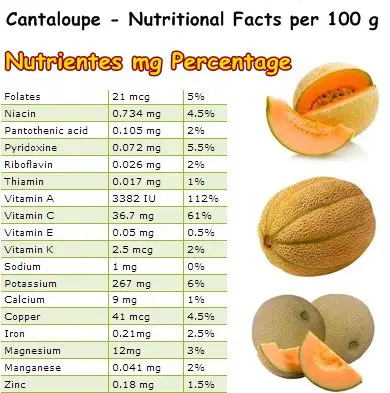A distinguished member of the Cucurbitaceae family, cantaloupe (Cucumis melo) is a sweet and fragrant orange-fleshed melon. Other denominations include: cantaloup, cantelope, sweet melon, Persian melon and muskmelon. Cantaloupes provide a wide range of essential vitamins and minerals, notably vitamins A and C, and regular consumption can load the body with important nutrients and much-needed energy as well as contribute immensely to good vision and healthy eyes.
What does cantaloupe look and taste like?
Cantaloupes have a firm, deep yellow or orange flesh. The skin varies according to variety from a grayish, green ribbed rind to a thinner, deep yellow rind with small patches of green. Most varieties have an incredibly fragrant, sweet and juicy flesh, while others can be just a bit too hard to swallow, and thus need to be washed down with some water. Regardless, cantaloupe consumption can provide a wide range of wonderful health benefits.

Cantaloupe nutrition facts and benefits
Although the mechanisms are still unknown, eating fruits such as cantaloupe on a regular basis can lower the risks of developing metabolic syndrome, also known as (metabolic) syndrome X. Researchers evaluated the effects of fruit consumption on a few hundred women in Tehran, the capital of Iran (where, interesting enough, cantaloupes originated). The study concluded that the women who ate the highest amounts of fruit per day (more specifically around 340 g) reported a significantly lower risk of developing metabolic syndrome.
The preferred fruit choices included cantaloupe, apples, grapes, watermelon and bananas. Moreover, researchers found that women who had consumed the highest amounts of fruit had healthier levels of the C-reactive protein (CRP) in their blood. The C-reactive protein is a indicator commonly used for inflammation screening. High C-reactive proteins have been linked with a number of life-threatening diseases such as cancer, liver failure and cardiovascular disease.
The phytochemicals found in cantaloupe, watermelons, grapes and other fruits are believed to have contributed to maintaining healthy CRP levels, thus contributing to a significantly lower risk of metabolic syndrome. Cantaloupes, in particular, have great anti-inflammatory properties. They contain two potent phytochemicals, cucurbitacin B and cucurbitacin E, both of which efficiently reduce inflammation.

In addition to this, cantaloupes are an incredibly rich source of vitamin A. Approximately 100 g of fresh cantaloupe contains about 169 micrograms of vitamin A (or 3382 International Units), as well as alpha and beta-carotene. Alpha-carotene and beta-carotene are vitamers of vitamin A, which means our body converts them into vitamin A.
Good to know: the beautiful, deep orange flesh of most cantaloupe varieties and orange fruit and vegetables in general indicates the presence of carotenoids. Other similar compounds present in the fruit are lutein and zeaxanthin, both of which have antioxidant properties, protecting the retina from free radicals found in blue light waves.
Aside from ensuring a healthy vision and good eyesight, the fruit also helps maintain healthy mucous membranes and supports the immune function thanks to a high vitamin A content. Cantaloupes are also a great source of vitamin C, providing 36.7 mg of the nutrient for every 100 g. Vitamin C is a potent antibacterial, anti-inflammatory and antioxidant which supports the production of collagen, the main structural protein which keeps us looking young and fresh.

Moreover, the fruit provides small amounts of B vitamins and minerals such as potassium, magnesium, copper, manganese, iron and zinc. As for macronutrients, 100 g of cantaloupe has 34 kcal, 8 g of carbohydrates and almost 8 g of sugar which, together with the B vitamins and minerals, contribute to energy metabolism and restore vitality. Overall, cantaloupes are considered a nutritious fruit which supplies the body with important antioxidants, vitamins and minerals, boasting several wonderful health benefits.
What is cantaloupe good for?
Here is a list of the top 9 health benefits of cantaloupe:
- Good for eyesight, promotes visual acuity and protects against damage from sunlight radiation.
- Benefits for skin and immune-boosting action thanks to an excellent vitamin A and C content.
- Has anti-inflammatory and antioxidant properties via antioxidants such as carotenes and vitamin C.
- Stimulates collagen production in the skin for better skin elasticity, and combats premature wrinkles.
- Low in calories, but nutritious, cantaloupe makes a good food for healthy weight loss.
- Source of dietary fiber for relieving constipation naturally, with benefits for intestinal transit and gut health.
- Source of B vitamins for energy metabolism, cantaloupe combats tiredness and fatigue.
- High in sugar and carbohydrates, cantaloupe combats hypoglycemia and associated symptoms: tiredness, dizziness, lethargy, fainting.
- Minor benefits for high blood pressure owed to a modest potassium and magnesium content.
- Has tonic properties as a result of a varied mineral profile.
Conclusion
A serving of fresh, juicy, fragrant cantaloupe can be the perfect ending to a delicious dinner or a very satiating snack. Even children will adore it and because it has a high water content and a sweet taste. Cantaloupe is also a great food for counteracting dehydration, especially during summer. Its high carotenoids and vitamin A content makes it ideal for good vision and skin health as well as gives it immune-boosting properties. Everything nature offers us has a purpose and cantaloupe is no exception.
